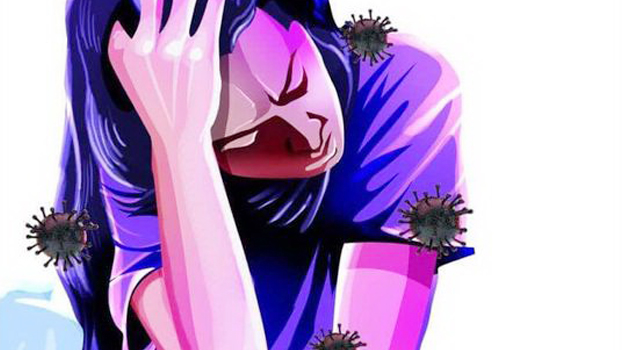What comes after the pandemic is over?


Monidipa Saha
While the world is trying to combat COVID-19 pandemic, mental health experts are focusing on post-pandemic short and long-term mental health impacts. Our current situation is stressful, it’s even wicked from them those who are suffering from mental illness.
The aftermath of the pandemic is going to be economic depression, joblessness, diminished life’s savings, an increase in drug and alcohol consumption, broken relationships, experience of trauma, grief, and death, and a lot of mental health issues than before.
The higher the trauma, the more feeling of powerlessness. A report published in The Lancet Psychiatry on June 9, 2020, claims before COVID-19, 20% of the global disease burden was attributable to mental disorder.
Recent evidence suggests post-pandemic will increase the risk of developing psychiatric disorders. The post-pandemic world and its expertise are going to be different for everyone; there is a high chance of an increase in depression, anxiety, or even suicide.
Lessons learned from the previous tragedies shows us
psychological interventions have a higher prevalence
than themselves. Consequences of the COVID-19 pandemic
will bring experiences of mental ill-being and can exacerbate
pre-existing mental health conditions. Self-help techniques,
resilience building, understanding the trigger points of mental
breakdown, reaching out and tailored mental health approach
can minimize mental ill-health pandemic
To restore the balance in the world, besides financial and psychical well-being, we have to address mental well-being. Health Psychologist and Stanford Scholar Kelly McGonigal shared three mantras to keep mental health in check.
Firstly, perceiving stress as a form of energy. Stress brings more glucose into muscles and oxygen into our brain, triumphing muscles and brain to perform at their peak.
It enhances our perception, intuition, and self-control. It makes it easier to understand what needs to be done, ensuring a positive impact. Secondly, accepting stress to increase resilience.
In a stressful situation, our body releases Neuropeptide Y, which is increasingly suspected to be a potential ‘stress-resilience’ factor in humans. It allows us to perform better the next time we are under extreme stress. Our body also releases DHEA (Dehydroepiandrosterone), which enhances memory and reduces symptoms of depression, also decreases the risk of heart disease.
So, after a stressful experience, our brain can grow more reliable and more capable of handling pressures in the future; last but not least, we need to acknowledge anxiety as we experience. We need to remind ourselves stressor is not bigger than us. Reaching out, social connection makes our worries less powerful and brings hope into our lives.
We need to reflect on our stress response; practicing a positive mindset when it comes to stress gives us a response later when it hits us again. Physical and psychological stressors activate dopaminergic circuits, we feel optimistic and want to do meaningful work. Dopamine generates a coping response to stress.
Oxytocin works as a social caregiver, activates empathy, connection, and trust, as well as a stronger desire to bond or are close to others. According to McGonigal, thinking about stress positively may lead to a healthier life for a more extended period.
Given our current healthcare uncertainty, not everyone can afford therapies. We can be our best resources in times like this. If we can peak our emotional response and retreat, we come out stronger than ever. Whether you are overwhelmed by our own mental health issues or other sufferings, the way to find hope is to connect.
Reaching out approach goes beyond helping ourselves, in situations of powerlessness, doing something to support others can help us sustain our motivation and optimism. Being thoughtful for others changes emotional response in brain, produce feelings of hope and courage.
Family and community-based approaches help us connect with culture; social supports can help in prevention, assessment, treatment, and recovery. It promotes autonomy and choice.
It is essential to have a system that emphasizes wellness, supports good health, addresses the issues that contribute to poor mental health, and maximizes protective factors. This tailored mental health approach can intervene in early signs of mental illness.
Lessons learned from the previous tragedies shows us psychological interventions have a higher prevalence than themselves. Consequences of the COVID-19 pandemic will bring experiences of mental ill-being and can exacerbate pre-existing mental health conditions.
Self-help techniques, resilience building, understanding the trigger points of mental breakdown, reaching out and tailored mental health approach can minimize mental ill-health pandemic.
Monidipa Saha is Lecturer, Faculty of Arts and Social Sciences, American International University- Bangladesh


